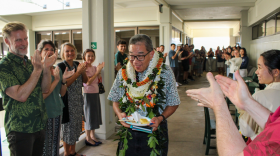The state is considering giving free meals to all public school students in Hawaiʻi.
Thousands of students already take advantage of programs for free or discounted meals, but access often depends on a family’s income. Many students in low-income families need the support but can't get it.
“They don't qualify for any financial assistance. And so they just have to make it work, figure out where the money can come from,” said Jordan Smith, senior policy analyst for food equity at Hawai‘i Appleseed Center for Law and Economic Justice.
House Bill 1775 would make meals free for all students.
Last week at the state Capitol, students from Castle High School were among many who supported the bill. The House Committee on Education unanimously approved the bill.
“When I was younger, I wasn't eligible for free school lunch. My parents would always have to do things like odd jobs and stuff to pay for my breakfast and my lunch,” said Castle High junior Nakoa Suzukawa.
“Now, I am eligible for free school lunch, but I still have some friends and I still have to hear their stories and see the things that they can and can't do because they're not eligible. Maybe their parents aren’t living paycheck by paycheck but they're pretty close to it," Suzukawa added.
Smith authored a January report for Hawaiʻi Appleseed arguing for free school meals. She said that in states with universal free school meal programs, child food insecurity decreases and academic scores increase.
“States that have implemented universal free school meal programs have seen, on average, a 5% decline in their households that are classified as food insecure. Targeting childhood food insecurity is particularly challenging, so to see that direct correlation is just really amazing,” Smith said.
Eight states — California, Maine, Minnesota, New Mexico, Colorado, Vermont, Michigan and Massachusetts — offer universal free school meals.
Smith said some individual cities have also found promising results: Students who are not hungry do better in school.
“After this implementation of universal free school meals in New York City, their student test scores improved by the equivalent of six weeks of additional schooling,” she said.
There has been enthusiasm around the bill so far, but the state Department of Education, while it supports the idea of free meals, has expressed concerns about the $32.7 million cost at the current 50% participation rate.
Still, advocates are optimistic because the department’s current estimate is lower and more reasonable than the $63.8 million estimate last year, making it more palatable to state lawmakers.
It’s also close to the cost estimated by advocacy groups. Hawaiʻi Appleseed said it’ll take only $25.6 million with the projected increased participation. At that price, it’s a no-brainer for advocates.
“If their estimate is what it actually cost, we should still definitely do it," said Nate Hix, social impact policy manager for the Hawai‘i Public Health Institute. "We've seen test score improvements and academic performance improvements from students increase by 15% when they've implemented free school meals elsewhere."
"The $30 million estimate from the DOE is about 1.5%, maybe 2% of the current DOE budget,” Hix said.
HB 1775 now awaits a hearing with the House Committee on Finance.







